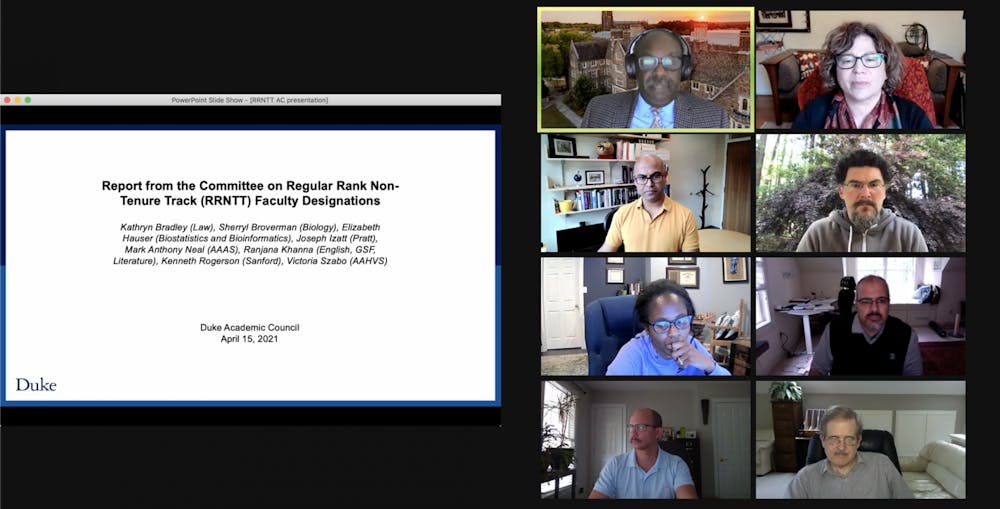The Academic Council discussed potential changes to the titles and responsibilities of non-tenure-track regular rank faculty at its Thursday meeting.
Sherryl Broverman, professor of the practice of biology and global health, presented the findings of the Ad Hoc Committee on Regular Rank Non-Tenure Track Faculty Designations, which examined how certain faculty titles are utilized at Duke. The committee primarily looked at what distinguished ranks from each other, whether ranks should be added or consolidated and potential pathways for promotion.
“Regular-rank non-tenure-track faculty are critical members of the professoriate at Duke,” Broverman said. “There are some parts of the University that cannot function without them.”
Duke hires more regular-rank non-tenure-track faculty—professors of the practice, research professors, lecturers and senior lecturers—than most of the peer schools cited in the report, with some programs like the Programs in Education and International Comparative Studies hiring only these faculty.
The committee found inconsistent expectations for these faculty across schools, excluding the School of Medicine and School of Nursing. Research professors and professors of the practice have the greatest variation in job responsibilities and evaluation criteria for promotion, according to the findings.
“Despite the different titles, many units had job expectations for [professors of the practice] that differed little from tenure-track faculty,” Broverman said. She added that “practice” takes on different meanings depending on what unit the faculty member belongs to.
There are also disparities in salary, especially along gendered lines.
The committee proposed reclassifying lecturers as teaching professors, given that the primary focus of the job is teaching. The research professor title would be maintained for those whose primary responsibility is independent scholarship and not instruction. The professor of the practice title would be for those who have careers outside of academia, and two offshoots—professor of the arts and career track professor—would be applied depending on the faculty member’s expertise and training.
The committee also proposed establishing new paths to tenure for regular rank faculty and providing longer contracts to non-tenure-track faculty with “track records of excellence.” It also proposed granting greater access to academic leave and sabbaticals for faculty that are expected to produce research.
“There has been a longstanding need for clarity to be brought to the expectations, responsibilities and career pathways” of professors of the practice, said David Malone, professor of the practice of education.
In other business
A group of faculty affiliated with the Sanford School of Public Policy presented their proposal for a new executive master’s program in national security policy. If approved, the hybrid program for mid-career professionals would aim to broaden the perspective of students who previously had “narrow experiences” in the field, Sanford Dean Judith Kelley said.
The program would align with Sanford’s goal of broadening their professional offerings. Since next year is the 50th anniversary of the school, Kelley said, “now is the time for this next step.”
Faculty will vote on this proposal and certify degrees for 2021 graduates at the May 6 meeting. Degrees will be conferred on or after May 7 pending the approval of the Board of Trustees, Haynie said. Election results for the 2021-22 Executive Council will also be announced at the May 6 meeting.
In an executive session closed to the press, the council discussed conferral of honorary degrees for 2022 commencement.
Get The Chronicle straight to your inbox
Signup for our weekly newsletter. Cancel at any time.

Nadia Bey, Trinity '23, was managing editor for The Chronicle's 117th volume and digital strategy director for Volume 118.

